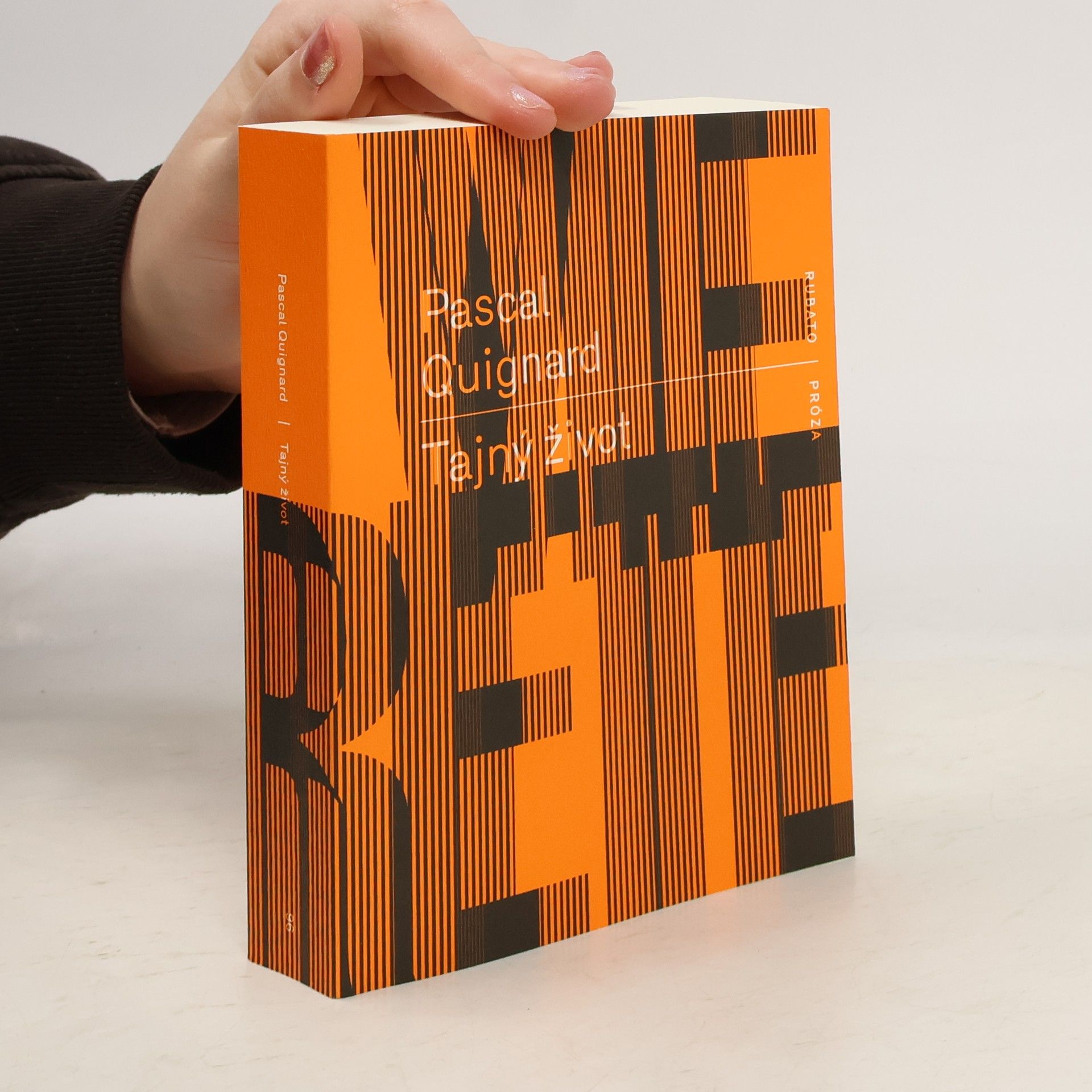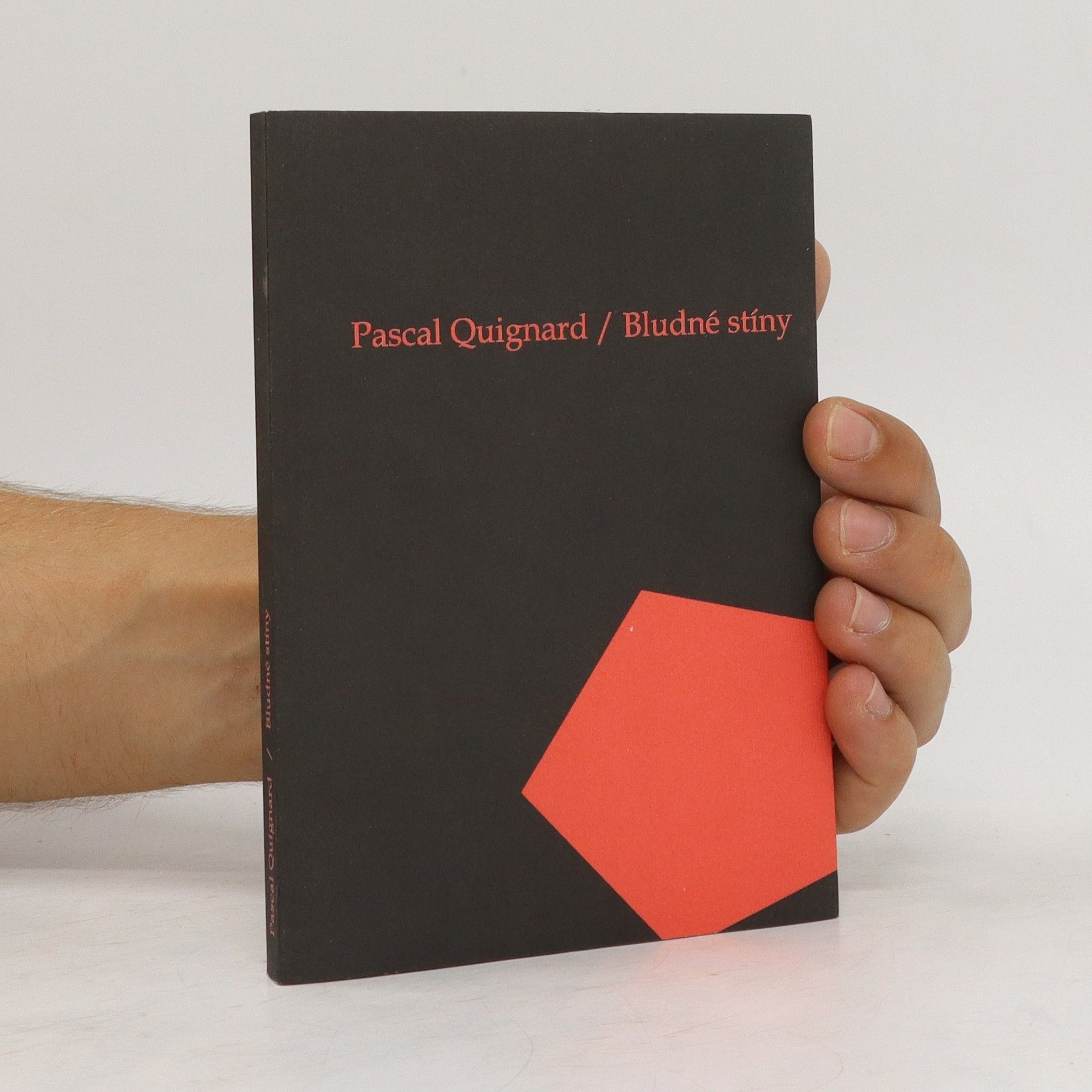Všechna jitra světa
- 102 stránek
- 4 hodiny čtení
Novela současného francouzského spisovatele se odehrává ve Francii 17. století a jejím leitmotivem je pochopení hudby a vztah k ní. Ve zfilmované podobě vytvořil hlavní roli Gérard Depardieu.
Pascal Quignard je francouzský autor, jehož dílo objevuje hlubiny lidské existence s jemnou elegancí. Jeho psaní, které často splývá mezi románem, poezií a esejí, se vyznačuje pronikavým pohledem na témata jako paměť, touha a ticho. Quignardova práce zkoumá složité vztahy mezi historií, uměním a osobní zkušeností, přičemž využívá bohatý a poetický jazyk. Jeho tvorba vybízí čtenáře k zamyšlení nad pomíjivostí života a trvalým dopadem uměleckého vyjádření.







Novela současného francouzského spisovatele se odehrává ve Francii 17. století a jejím leitmotivem je pochopení hudby a vztah k ní. Ve zfilmované podobě vytvořil hlavní roli Gérard Depardieu.
První díl trilogie Bludné stíny – O dávných časech – Hlubiny, oceněný Goncourtovou cenou za rok 2002, není ani román ani esej, kniha se pouze představuje jako sbírka fragmentů, jež se plaví ve vodách učenosti a všednosti, jako kdyby autor pouze zachycoval myšlenky a dělal si poznámky k nějakému velkému dílu, které se chystá napsat. Nakonec se ale rozhodl ustoupit od původního záměru a vynesl na světlo jen ony črty. Čtení knihy pak má pro něj podobu „bloudění“, neboť, jak píše, „ve čtení je očekávání, které se nesnaží dosáhnout nějakého konce. Číst znamená bloudit.“ Bloudíme tedy s ním od císaře Tiberia k Descartesovi, od Lao-Tse k Tereze z Avily, od sporů prvního krále Franků Chlodvíka s posledním římským králem na území Galie Syagriem k pařížským putováním mademoiselle Joncoux, staré samotářky z Port-Royalu.
Pascal Quignard naplňuje přesně klišovitou představu francouzského spisovatele. Dlouhá léta pracoval v nejprestižnějším pařížském nakladatelství Gallimard, jeho knihy mají silný intelektuální přídech a také jsou typicky „po francouzsku“ útlé. Výjimkou není ani Terasa v Římě. Příběh rytce, obraz člověka poskládaný z rozsypaných a poztrácených karet, příběh lásky, tichý, postupně se rozvodňující potok lidského života, podemleté břehy, které se sesouvají – skromné mistrovství Pascala Quignarda, autora slavného románu Všechna jitra světa, po zásluze oceněné cenou Francouzské akademie.
A captivating and wide-ranging interpretation of accidental dismounting. In Pascal Quignard’s writing, philology hunts for wild game in a dark forest. The Unsaddled , which features horses as its central figure, is no exception. Taking off from puns, multifarious imagery, and metaphorical meanings—“to be baffled,” “to be thrown”—that the book’s title provides, Quignard focuses on life-changing moments. We meet George Sand (whose father died after being thrown from his horse), Saint Paul, Abelard, Agrippa d’Aubigné, and countless other writers, philosophers, theologians, or kings who fell off their horses—not to forget Jean-Jacques Rousseau, who was knocked over by a dog. Being “unsaddled” can also be associated, as Quignard shows in regard to Nietzsche, with an “overturning” of values. Scenes of war, hunting, “fleeing” or sexuality—“When lovers have a horse ride, they gallop in another world”—come before our eyes, each time from those unsettling vantage points that Quignard knows how to find. As ever, he ranges far and wide in his intense quest, taking examples from across human history, from the neolithic age to his own childhood memories of postwar Le Havre in northern France.
“ Last Kingdom is a set of books that . . . is neither philosophical argumentation nor little disparate, scholarly essays, nor novelistic narrative; gradually, for me, all genres have fallen away.” So writes Pascal Quignard of his monumental book series, Last Kingdom . In the latest volume, The Fount of Time , he focuses on the paradoxically immediate presence in our lives of the deepest, most distant past. He explores this subject through a multitude of fragments of autobiography; curious folktales; literary snippets; historical anecdotes both classical and modern; ruminations on biology, archaeology, and linguistics. Using all of these forms, he confronts dimensions of human experience which, though customarily conveyed in legend, myth, and dreams, run somehow beneath the everyday world and yet are part of our most tangible reality. To enter Quignard’s horizonless time-space is to embrace a rich vision in which the totality of human history and culture is placed disconcertingly on a single footing. In The Fount of Time we are able to glimpse—whether through obscure cultural detail or unusual anecdote—“another world beneath the world.”
Prolific essayist, translator, and critic Pascal Quignard has described his Last Kingdom series as something unique. It consists, he says, "neither of philosophical argumentation, nor short learned essays, nor novelistic narration," but comes, rather, from a phase of his work in which the very concept of genre has been allowed to fall away, leaving an entirely modern, secular, and abnormal vision of the world. In Abysses, the newest addition to the series, Quignard brings us yet more of his troubling, questing characters--souls who are fascinated by what preceded and conceived them. He writes with a rich mix of anecdote and reflection, aphorism and quotation, offering enigmatic glimpses of the present, and confident, pointed borrowings from the past. But when he raids the murkier corners of the human record, he does so not as a historian but as an antiquarian. Quignard is most interested in the pursuit of those stories that repeat and echo across the seasons in their timelessness.
When translator Claire Methuen travels back to her hometown of Dinard for a family wedding, she runs into her old piano teacher Madame Ladon. After befriending the ageing woman, Methuen begins to toy with the idea of a permanent return to live in Brittany. She becomes increasingly obsessed by her childhood sweetheart, Simon Quelen, who, now married and a father, still lives in a village further down the coast where he is the local pharmacist and mayor. Having moved into a farmhouse, she soon spends her days walking the heathland above the cliffs and spying on him as he sails in the bay. As she walks, she is at one with the land of her childhood and youth, "her skull emptying into the landscape." And when her younger brother Paul comes to join her there, the web of solidarities is further enriched. This is a tale of dramatic episodes, told through intermingling voices and the atmospherics of the austere Breton landscape. Ultimately, it is a story of obsessional love and of a parallel sibling bond that is equally strong.
A novel of intersecting historical threads. The Tears is, at one level, a novel about the turbulent lives of twins, the sons of Charlemagne's daughter Bertha. The studious and scholarly Nithard succeeds his father Angilbert as lay abbot of the Abbey of Saint Riquier in Normandy and accompanies his cousin the emperor Charles the Bald on his military campaigns. His twin brother Hartnid strikes out boldly for more exotic parts--including, eventually, Baghdad--in a seemingly deranged quest to track down the elusive female face that haunts his dreams. Yet this novel of intersecting historical threads and patches of poetic reimagining is crisscrossed by a host of other themes: the enigmatic joys afforded by nature, the intimate relation between living creatures which literature has since earliest times depicted, and the mysterious power of contingent events that have shaped entire cultures--including the birth of the French language itself. This heady brew of medieval chronicle, miraculous folktale, and speculative reconstruction of history further strengthens Pascal Quignard's status as one of France's most imaginative contemporary writers.